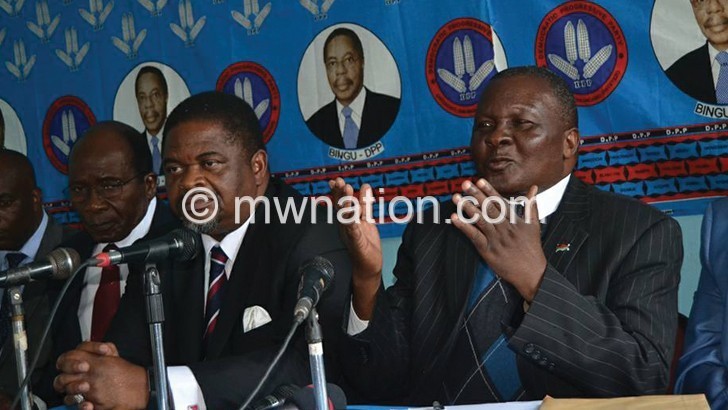K145m battle rages on
Twists and turns yesterday characterised the legal battle between Mzuzu-based Youth and Society (YAS) and governing Democratic Progressive Party (DPP) over the contentious K145 million cut in the K2.8 billion Malawi Police Service (MPS) food rations deal.
Barely hours after High Court Judge Jack N’riva dismissed the matter on the basis that YAS, a local civil society organisation (CSO), had no sufficient interest to pursue the matter, the organisation rushed to Malawi Supreme Court of Appeal and obtained an order to put aside implementation of the lower court ruling.

Lawyer representing YAS, Bright Theu, declined to grant an interview to The Nation, but the organisation’s executive director Charles Kajoloweka confirmed last evening obtaining the stay order.
He said: “I can confirm that we have indeed obtained a stay order and hearing is tomorrow [today] at 14.00hrs. But for further details speak to our lawyer [Theu].”
Delivering judgement on an expartes application by YAS, N’riva earlier ordered Standard Bank plc and National Bank of Malawi (NBM) plc to freeze accounts for the DPP and Pioneer Investment Limited, the MPS food rations supplier who deposited K145 million into a DPP account whose sole signatory is President Peter Mutharika.
But reacting to the order putting aside the High Court ruling, one of the defence lawyers, Chancy Gondwe (representing the DPP), said they will challenge the Supreme Court decision as the order was obtained erroneously.

He said: “It has been obtained by suppression of material fact… They [applicants] did not present to the court the actual fact on record so they made misrepresentation to the court and made that order.”
Gondwe said the stay was supposed to be obtained from the same judge who made the ruling and not from a single Supreme Court judge.
The High Court started hearing the matter early this month on whether YAS was an interested party in the case.
Gondwe and Frank Mbeta, who was representing Pioneer Investment, told the court YAS was out of its jurisdiction and requested it to dismiss the matter in accordance with Section 98 of the Constitution which stipulates that only the Attorney General (AG) has powers to sue on behalf of Malawians.
Earlier yesterday, N’riva sustained the objections made by the defence team and dismissed the case.
Further, the court discharged the freezing orders on the DPP and Pioneer Investment Limited bank accounts which YAS obtained.
Reacting to the development in an earlier interview soon after the ruling, Kajoloweka described the outcome as “retrogressive and a careless incentive to organised corruption and impunity”.
On his part, spokesperson of the opposition Malawi Congress Party (MCP) the Reverend Maurice Munthali said they were unsatisfied with the outcome of the matter.
He said: “We have full trust in the Judiciary but because of such rulings, the fight against corruption in this country is only a fallacy. The way some corruption cases are handled and quashed by the courts of law leaves a lot to be desired. It is like opening up for more corrupt practices.
“We still feel justice has not prevailed in one way or the other and the fight against corruption will never succeed if those people stealing from poor Malawians are left scot free.”
But DPP spokesperson Nicholas Dausi said the outcome of the case vindicated their position that they were not wrong to say the money was a mere donation.
“There are constitutional bodies mandated to investigate or prosecute so for two or three people to come together out of anger or simply because of political posturing and start making demands to government, it does not work that way,” he said.
Dausi also said the party already refunded the money to Pioneer Investment Limited immediately after it announced its intention.
The case follows a leaked ACB investigative report, which claimed that Pioneer overcharged the police by K466 million on the basis of 20 percent exchange rate losses that were neither incurred nor provided for in the contract.





